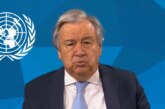Speaking at a high-level meeting at the ongoing UN Framework Convention on Climate Change (UNFCCC) COP 25 in Madrid, the minister presented India’s stand and said the country is “walking the talk”.

MADRID: India is “walking the talk” in its climate change commitments and has reduced emission intensity by 21 per cent of its GDP while also being on track to achieve the goal of 35 per cent emission reduction as promised in the Paris summit in 2015, Environment Minister Prakash Javadekar said on Tuesday.
Speaking at a high-level meeting at the ongoing UN Framework Convention on Climate Change (UNFCCC) COP 25 in the Spanish capital, the minister presented India’s stand and said the country is “walking the talk”.
“Climate change is real. The world recognised it and adopted a comprehensive agreement in Paris. Let us concentrate on the implementation of the Paris Agreement and not digress.
“If there is an inconvenient truth in the form of climate change, we are providing a convenient action plan. We are walking the talk.
“India has reduced emission intensity of GDP (gross domestic product) by 21 per cent and is on track to achieve the goal of 35 per cent emission reduction as promised in Paris,” Javadekar said.
The 25th Conference of Parties (COP 25), which commenced on December 2 in the Spanish capital and is likely to go on till December 13, is being attended by over 190 countries.
The minister said only six countries are on track to meet their nationally determined contributions (NDCs) and India is leading the list.
“Internationally, we launched the Coalition for Disaster Resilient Infrastructure which is a partnership to support countries through knowledge exchange and provide technical support on developing disaster and climate resilient infrastructure.
“Only six countries are on track to meet their NDCs announced in Paris. We are leading the pack. Sustainable lifestyle is a part of the ethos of India,” he said.
In his address, Javadekar said India was making progress in harnessing solar, biomass and wind energy. He also listed out all the efforts being made in the country to combat climate change.
“Prime Minister Narendra Modi announced 175 gigawatt (GW) target for renewable energy under Paris Agreement. We have already achieved 83 GW. (The) Prime Minister has subsequently increased the target to 450 GW at the recent UN Climate Action Summit. We are simultaneously progressing on solar, biomass and wind energy.
“We have put carbon tax on coal production at the rate of 6 USD per tonne. Even with 36 (political) parties represented in Parliament, we could achieve this unanimously,” he said.
The minister said India has promised to create additional carbon sinks of 2.5 billion tonnes to 3 billion tonnes of carbon equivalent by increasing green cover.
“In the last five years, our green cover has increased by 15,000 sq km. We are undertaking special projects like urban forests, school nursery, agro-forestry, water and fodder augmentation in the forest area.
“India prioritises adaptation as an integral part of climate action. Therefore, India will be investing about 50 million dollars in water conservation,” he said.
Referring to the decisions made in the 14th UN COP Convention to Combat Desertification (UNCCD) held in New Delhi earlier this year, Javadekar said 26 million hectares of degraded land will be restored by 2030.
“This is one of the largest programmes in the world to ensure carbon sink in land resources,” he said.
The minister shared with the delegates India was aiming to blend 20 per cent ethanol in petrol by 2030.
“The headline is that a commercial flight was operated on 100 per cent biofuel and we are targeting blending of 20 per cent ethanol in petrol by 2030. We have leapfrogged from Bharat Standard IV to Bharat Standard VI for vehicle emission norms and from 1st April 2020, vehicles will be BS VI compliant,” he said.
The minister said India will continue to do its bit to tackle climate change but with support of developed countries.
“This is the time for ownership and this is the time for responsible action. India has and will continue to do its bit — expecting commensurate multilateral action with developed countries taking the lead,” he said.


